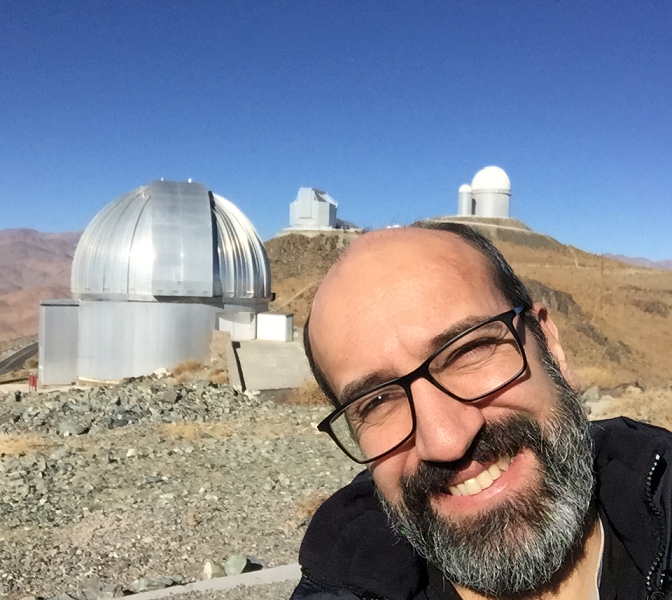At the age of fifty, Nuno Bixenio, an astrophysicist, wrote his name in the sky in the form of an asteroid, on Earth his work wanders through scholarships and decades of term, and despite the difficulties, he does not give up on science.
“I’ve thought about giving up a few times, but I really like it, I’m good at what I do,” said Lusa, without embarrassment, researcher at the University of Coimbra and the Institute of Astrophysics and Space Sciences and former president of the Association of Scientific Research Mission Recipients.
A Portuguese astrophysicist appeared in the news this week for naming an asteroid that was discovered on September 16, 1998, in an observing expedition at the Lowell Observatory in the United States.
Previously designated (40210) 1998 SL56, asteroid (40210) Peixinho was renamed, by decision, announced Monday by the Working Group on Nomenclature of Small Objects of the International Astronomical Union, an organization run by astronomer, also Portuguese, Teresa Lago. The proposal to name the asteroid came from the North American Observatory.
“Peixinho” is a rocky body belonging to the asteroid belt, between the orbits of Mars and Jupiter, and it orbits around the Sun at an average distance three times greater than that separating the Sun from the Earth, and completes an orbit in about 5, 3 years.
Nuno Peixinho specializes in the physical and chemical characterization of small bodies in the Solar System, such as asteroids, comets, and trans-Neptunian objects (icy bodies orbiting the Sun at an average distance greater than that of Neptune).
Through his work, which focused mainly on the observation and study of trans-Neptunian objects, he traveled to the Canary Islands and the Sierra Nevada, in Spain, but also to Hawaii, in the United States, and Chile to observe these objects using telescopes and “perceive how they work” from a point of light.
“It is wonderful to try to figure out how and why things work,” he asserts, arguing, to the most questionable, that his work could allow us to understand how the solar system was formed or how life appeared on Earth.
He asserts that the future “is space”, and that one day “humanity will have to find alternatives” to stay “on another planet or in a city in space”, because Earth is not eternal, even if its end is far away. , was predicted in brochures within billions of years.
In a romantic way, Nuno Peixinho’s work has little and can be boring and generate sleepless nights, he admits: Instead of observing the sky through a telescope’s eyepiece, one looks at a computer that has sent an image of the sky captured by the telescope’s digital camera, hours at a time. Full nights.
With no prospects for a stable life, an idea to which he was accustomed for a long time, the scientist did not start a family, rented a house instead of buying, conducted research on an intermittent basis.
“No one ventures into big projects, I don’t know where I will be in three years,” the Portuguese delegate to the Users Committee at the European Southern Observatory, which operates one of the world’s largest telescopes, was shot.
A scholar on a scholarship or a term contract may be “months without a penny” while awaiting the outcome of a new competition, as one “invests very seriously,” perplexed by the “tempo” of the scientific work at hand, a “very competitive” process.
“But, in fact, he liked it very much, and in the midst of difficulties we managed to survive,” he supposes, repeating his taste for scientific research.
“Years and years of doing this have passed, and now it is absurd to do something else, and what? It is another world, it means a radical change, it means a second life, starting from scratch ”, justifies the astrophysicist.
His precarious livelihood in science was based on scholarships and fixed-term employment contracts.
He still teaches at the University of Coimbra to Masters students of the Planetary Science Chair, but for free. An example of “scholars volunteering,” says Nuno Bixinho, a recent member of the regional coordination center for the National Federation of Teachers (Fenprof).
The astrophysicist puts his finger on the wound: in Portugal, scientific research is carried out mainly by scholarship holders and contractors. “The scientific profession is practically dead, there are no open competitions, only the teaching profession,” he complains, adding that universities with research centers are “underfunded.”
For Nuno Peixinho, the Science and Technology Foundation – the main entity, under government subordination, that supports scientific research in Portugal, that is, through grants and fixed-term contracts – “is the country’s temporary employment agency”.
“Pays scholarships, temporary work contracts and higher education institutions have no responsibilities or burdens,” he criticizes, advocating a “program for integration into the scientific profession,” with a schedule of competitions and identification of vacancies.
An asteroid like the one named after him “could be millions of years in the same place.” Nuno Bixenio continues in the place he calls the world. “Who loves it is to go to the end. I only give up when it’s not worth it and that’s the part I don’t understand yet.”

“Wannabe internet buff. Future teen idol. Hardcore zombie guru. Gamer. Avid creator. Entrepreneur. Bacon ninja.”

